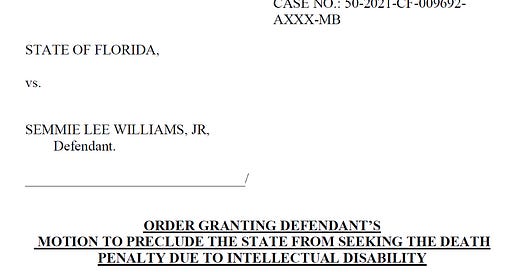Palm Beach County: Trial court determines Semmie Lee Williams, Jr. ineligible for death penalty
On Tuesday, a Palm Beach County court issued an Order finding Williams to be intellectually disabled. Therefore, the court prohibited the imposition of the death penalty.
Semmie Lee Williams was indicted for first-degree murder. On January 28, 2022, the State filed its Notice of Intent to Seek the Death Penalty against Williams. On February 21, 2024, Williams filed a Motion for Pretrial Order Precluding the State from Seeking the Death Penalty due to the Intellectual Disability of the Defendant (the “Motion”). In the Motion, Williams argued he is ineligible for the death sentence because he is intellectually disabled.1 To establish intellectual disability, Williams had the proven of proving: (1) significantly subaverage general intellectual functioning; (2) existing concurrently with deficits in adaptive behavior; and (3) manifestation of the condition before age eighteen.
The Court held an evidentiary hearing on the Motion from November 18-25. Williams presented the testimony of several fact and expert witnesses. The defense presented the testimony of two doctors in rebuttal.
On Tuesday, the Court issued an Order granting Williams’ Motion.
First, the Court found that Williams’ IQ range is in the fifties and, therefore, the first prong is met.
Second, relying on testimony from Williams’ family members as well as experts and comparing Williams’ case to prior Florida Supreme Court cases, the Court found that Williams’ established deficits in adaptive behavior, concluding:
A typical 40 year old would be expected to keep proper hygiene, live independently, have consistent employment, and to have a social circle and romantic relationships. Ultimately, having considered the evidence and record in this case, the court agrees with and finds Dr. Fabian’s assessment that Defendant does have concurrent deficits in all three domains of adaptive functioning compelling and more credible than that of Dr. Brannon. On balance, while the court finds Defendant does show some strengths, the court does not find the evidence presented by the State to be of such magnitude as to rebut or directly contradict that Defendant does suffer significant deficits. Stated differently, the court finds Defendant has demonstrated by clear and convincing evidence that he satisfies the second prong of the intellectual disability analysis.
Third, the Court found that the prong was met—that the evidence established that Williams’ “deficits manifested prior to turning eighteen years old.”
Based on its findings, the Court concluded:
The court is keenly aware of and deferential to the power of the State to seek the death penalty. In this case, when Defendant challenged the State concerning that power, the State failed to provide the necessary countervailing evidence to undermine the clear and convincing evidence produced by Defendant. Stated another way, the State failed to create any hesitancy in the mind of the trier of fact concerning Defendant’s claim of intellectual disability. This is profoundly manifested when considering that the State found Defendant’s full scale IQ score to be 57; that there was no evidence to rebut Defendant’s deficits in adaptive behaviors; and further no evidence to rebut that these prongs considered collectively and conjunctively support a finding of intellectual disability. The court has considered legal authority throughout this state and nation and finds few if any cases with the facts herein.
Having carefully considered the testimony and evidence presented at the evidentiary hearing, the court concludes that Defendant has established by clear and convincing evidence that he is intellectually disabled within the meaning of section 921.137(1), Florida Statutes . . . .
Accordingly, the Court granted Williams’ Motion and stated that “[t]he imposition of the death penalty . . . is prohibited.” The State has the opportunity to appeal the Order.
The full Order can be downloaded here.



